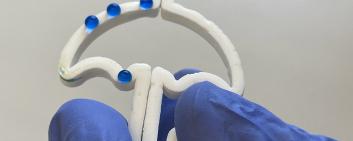Since the beginning of 2000, companies have emerged in western Switzerland that have become a talking point in the medical technology segment and have helped the region win a reputation as the "Health Valley. These include start-ups, educational institutions or even renowned multinational companies. On a global level, Switzerland has a clear leading role in medical technology. In no other country in the world does medical technology contribute so much to gross domestic product (GDP) as it does in Switzerland.
Leading the fight against cancer
At the end of October, ADC Therapeutics, a company based in the French-speaking part of Switzerland that is researching state-of-the-art cancer treatment methods, set a European record for project financing. Nearly 200 million Swiss francs were raised by private investors. The funds procured will be used to develop two drugs designed to combat several subtypes of lymph node cancer and leukemia. Meanwhile, ADC Therapeutics has announced that positive results from the testing phase were presented by the American Society of Hematology (ASH) at the beginning of December. The data presented were obtained from 138 test subjects who had previously undergone various unsuccessful treatments. The researchers at ADC Therapeutics may have taken major step forward in the fight against cancer.
Innovation for the elderly
The medical technology sector is also convincing in other parts of the country. In particular, the universities are constantly achieving groundbreaking results. Thus a team from the Bern University of Applied Sciences developed a high-end fall sensor that can be charged without contact, for example. The small fall sensor called "Aide-moi" (French for "help me") can be attached to the body relatively inconspicuously by a patch, and can be worn even when showering - a situation where the risk of falling is greater. Thanks to a long-range home station, a fall is registered throughout the house or garden, and the predefined helpers are informed automatically.
Cutting-edge heart implant
This July, ETH Zurich caused a sensation with a heart made on a 3D printer. The soft artificial heart was made of silicone, weighs 390 grams, has a volume of 679 cm3 and pumps very much like a human heart. Nicholas Cohrs, doctoral student at the ETH and developer of the heart, was able to prove that the artificial heart works in principle. However, it currently only lasts for about 3,000 strokes, which corresponds to a duration of about 30 to 45 minutes. Cohrs explained that the trial was merely a feasibility test. The goal was not to present an implantable heart, but to think in a new direction in the development of artificial hearts. The tensile strength of the material as well as the performance would have to be significantly improved.
Further information on the medtech location Switzerland can be found in our factsheet or in the Handbook for Investors.







